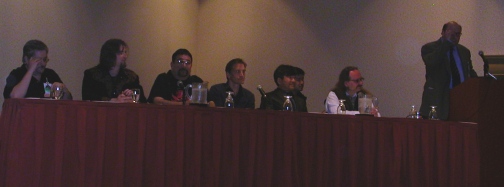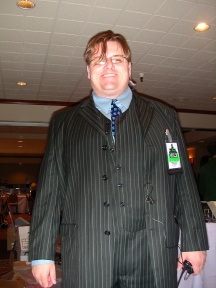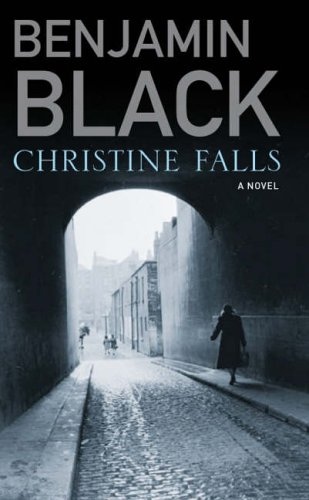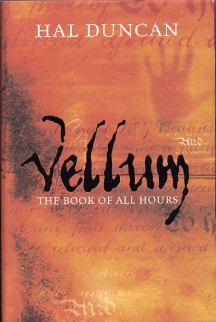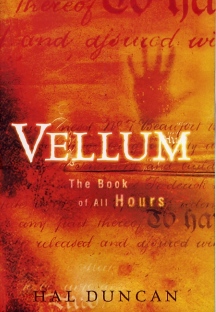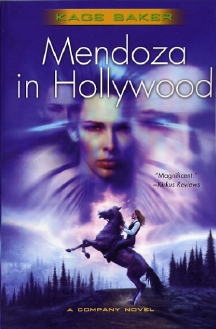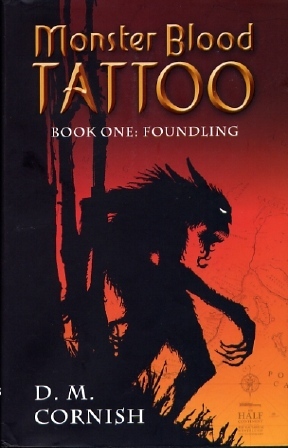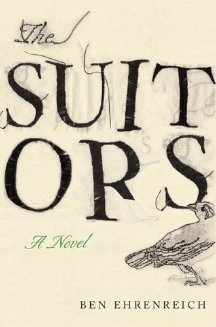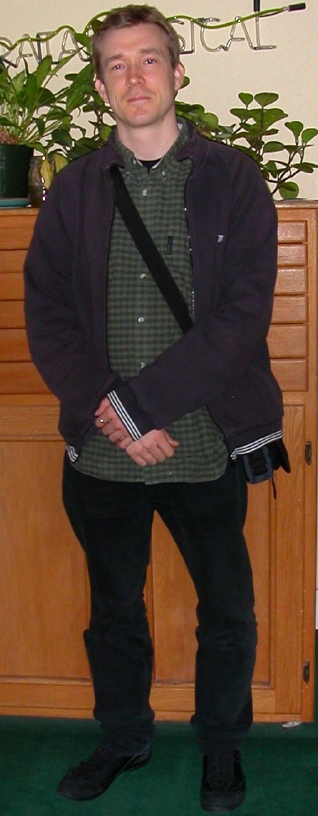|
|
|
This Just In...News from the Agony Column
The
Perfect Pitch Per Pelan, Kim Newman Closes Down the House
This morning's reports from yesterday feature the two events I managed to attend. The first report comes from John Pelan's one-man panel on the perfect pitch for your novel, brilliant collection of stories or your multi-volume series about immortal whatnots. And yes, Virginia, there were pitches for immortal whatnots and they were good pitches at that. Oh my. I've known John Pelan, from conventions, since I meet him at the World Fantasy Convention back in the before time. I must admit, I was a bit surprised, and pleased at his rather reserved and professorial air. He was so innately calm that he'd easily able to handle a roomful of surly teenagers, though in my experience it only takes one surly teenager to fill a room. And that reserve would of course be needed to combat the high-wire tension of some number of folks who hope to become, or already are, writers on their way to getting to getting published. If you listen to the MP3 or the RealAudio file, you'll get a few tips from a man who has been on both sides of the desk, who has worn both the publisher hat and the writer hat. My second audio report is from the opening ceremonies. GOH Peter Straub started things off and to my mind, Kim Newman closed down the house with his "Hello/Goodbye" speech. But everyone on the panel comported themselves with the most difficult to find virtue at any panel or arrangement of this sort: brevity. You can hear the highlights in MP3 or RealAudio; and I myself shall try to learn from the lesson of my august betters. There's quite a bit to do today, and I'll likely be back later with more audio reports, Should the readers have any requests, just email me. For those who have already done so, I'm letting you know I'll be all over it today. And now to the joys of audio editing (which is actually fun) and editing the XML for the podcast file. I hosed the latter late yesterday afternoon, and thought I might have to go to a backup, which was, of course, at home. That's not proved to be the case, but for now the primary horror at the horror convention is XML. Even the science fiction version of me would not have predicted that! |
|
05-12-06: Report Number One from WHC |
|||
Kim
Newman & Jeremy Lassen, Dealers Room
More from him later; my first post is an audio podcast of two brief conversations in the dealer's room, one with Kim Newman, and one with Jeremy Lassen, Publisher of Night Shade books. Live, practically from the floor, here are an MP3 file and a RealAudio file. Enjoy! With more to come.... |
|
05-11-06: Benjamin Black Visits 'Christine Falls' ; World Horror Convention Note |
|||
The
Mystery of the Mystery Writer
Here's that rainy day, however, as the entertaining and literary Sarah Weinman (among others) has already spilled the beans. So that little Pan Mac catalog that's been sitting in the Rolling Shelves for less time than it spent on the work table had in it, among many other fascinating projects, a blurb about the just-arrived novel by Booker Award-winning John Banville writing as Benjamin Black, 'Christine Falls' (Picador / Pan Macmillan ; October 2006 ; £12.99). In what's growing to be a significant trend, what we have here is a writer associated with the prestigious and literary Booker prize dipping into the waters of genre fiction. In the past couple of years, we've had Kazuo Ishiguro's science fiction novel, 'Never Let Me Go', Julian Barnes' 'Arthur & George' and David Mitchell's 'Cloud Atlas'. But all of these have used genre elements as a portion of their literary fiction. It's a great use of, as Mitchell told me in my interview with him, "a whole section of the orchestra that is underemployed by literary writers." Writers who are brave, wise and skilled enough to take up a new tool are those whose work will entertain and engage their readers at a deeper, more permanent level. Their work will color the views of those who read it. But with 'Christine Falls', Banville is not simply adding elements of genre fiction to his literary work. Writing as Benjamin Black, he's entering the world of serial crime fiction in a straightforward manner. Now, this is not entirely unknown even on the list above. Barnes wrote mysteries about a bi-sexual police officer named Duffy early on in his career as Dan Kavanagh. At first, he found the genre liberating, and he wrote mysteries, he said, until he found the genre limiting. For those with unfiltered web access, the brand-new "Dan Kavanagh" website is really a hoot and well worth checking out. Banville is following the route of the early Barnes, stepping seamlessly from the world of haute literature into the world of genre fiction. Banville is known for his deliberately artistic work, polished, poetic prose and an abiding interest in exploring the profound depths. In an article for the Sydney Morning Herald, Banville explained that, "I am having a shot at that other kind of writing that I was talking about. Only it won't be me, it will be Benjamin Black writing it. These books Benjamin Black will write, they will not be the kind John Banville writes. They will be the kind Benjamin Black writes." He goes on to say, "So this novel Benjamin Black has written, which is me as Benjamin Black, is a piece of craftwork. It is not an art book; it is completely different to my usual work." Art or craft, 'Christine Falls' is beautifully written, and perhaps not as surprising as readers might think. Banville's brother is Vincent Banville, the author of at least three Detective John Blaine mysteries, including 'Canon Law' (2002), 'Death by Design' (1993) and 'Death the Pale Rider' (1995), as well as the more expected literary works. So this inclination to crime (fiction) seems to run in the family. In John Banville's case, the pseudonym is both obvious and concealed. That is, on the ARC, it says right there on the cover: "John Banville writing as BENJAMIN BLACK Christine Falls A novel Picador October 2006." But over at *.*.co.uk, you'll get no clue that Benjamin Black is anyone other than Benjamin Black. The novel will debut in the US in 2007, with the expected sequel in 2008. Why wait? The 'Christine Falls' that we're getting later this year in the UK, presumably in a signed edition from one of our many favorite vendors, is already the kind of book that has one whinging with anticipation. Banville's "craftwork" is a gorgeously written kick-off for the Quirke series of pathology thrillers. "It was not the dead that seemed uncanny to Quirke but the living." If Banville's sinking to "craft", he's not sinking too far. As the novel begins, Quirke finds his brother-in-law surreptitiously looking at a file marked "Christine Falls." It's not a good sign, and there's worse to come for the Quirke family and the city of Dublin. The great revelation here is not, however, the fate of Quirke or Dublin. It's the ever-growing intersection of literature and genre fiction. It's one thing for a literary writer to include genre fiction tropes in a work of literary fiction. It's another thing entirely to write a piece of unabashed genre fiction. At least for now. If this keeps up, and as the world falls for 'Christine Falls', the two efforts may no longer seem so different. |
|||
| I'm
There For You Of course I am -- that is here, at the World Horror Convention, for you, the readers. I'll be pulling in some great new interviews (I hope), and reporting in my own style on these news pages as the days progress. If there's anything you're interested in hearing about, let me know. There are some limitations as to what I can cover, but I'm happy to try. As you read this, I'm probably driving up to the convention. As I have more news, I'll post it, though there is always the indelicate imbalance between attending the events and writing them up. I trend to the attend! But I'll bring a camera. |
|
05-10-06: Hal Duncan 'Vellum' and Kage Baker 'Mendoza in Hollywood' |
|||||||
Reprints
and Reverse Evolution
In the first place, here is Duncan's chance at the Philip K. Dick Award. He's got his paperback original novel -- at least in the US -- that positively reeks of Philip K. Dick-style shenanigans, popping around time, space, gutting mythos and reading the entrails into his own peculiar version of reality. It would be a fine choice, though there are surely others to come as well. But this edition puts it in the running, and that's all for the best. Duncan is an original, and those inclined to buy PKD-award winners will find themselves well served by his surreal, entertaining visions. Moreover, Del Rey has done an outstanding job of reproducing the look and feel of the original edition. They've kept the cover quite similar, and even reproduced the multiplicity of fonts used in the original, albeit at a slightly smaller size, bringing the book in at 457 pages as opposed to 499. It's really not that much reduced and still a pleasure to read. They’ve used the same sort of fold-flap cover that worked so well with David Mitchell's 'Cloud Atlas', though to my mind the comparisons between the two are somewhat misguided. Not completely off the mark, mind you, but these two books approach the literary world from rather different directions. That said, most readers who enjoyed Mitchell's work would probably enjoy Duncan's, even if it does fit rather differently into the landscape of literature. You also get the ragged-cut pages of the US trade paperback of 'Cloud Atlas'. Generally, I'm not enamored of this cut, but I do have to admit that it makes the book look somehow "better". More like a piece of litrachur, older and classier than the flat cut. And the binding is loose enough so that at least when you’re in the middle of the book, and reading it while you have your carne asada burrito, it will lie flat. The reasons then you should buy this book, even if you already have the UK HC are, one, you can read it without worrying that you're going to wreck a valuable book. I know that readers who frequent this column have looong reading queues, and while you may own that first edition, you may not have read it. Now you can do so with no worries; and though the hardcover first is selling for not-so-daunting prices ranging from $10-$100, at least you can be assured that your investment -- or your must-have-for-the-personal-library perfect copy -- shall remain pristine. We must have a pristine copy, right? Or better, two, so that if the time comes and prices rise to the point of irresistibility, at least you won’t have to rip your guts out to sell it.
Moreover, none of the money from these used books ends up in the author's coffers. If we don’t pay Kage Baker to write, I bet she will still do so. But getting her books will become even more difficult and expensive. So by purchasing the new Tor re-release, with the nifty Paul Youll cover art, you can ensure that Baker gets at least some percentage of your samoleons. Of course, the reason to buy both of these books, even if you already have them, is that by doing so, presumably, you are sending a message to the publisher written on the back of your fifteen dollar bill. That message says: "More please." Now, publishers are known to listen to many sources as they evaluate which books to publish. But there is one metric that rules: sales. If we want to see more of the sort of books that we enjoy reading, we could do much worse than to buy those books in the various formats in which they are offered, as the publishers grind through the reverse-growth evolution of the publication cycle. Perhaps, in fact, this says something important about the nature of readers, of the markets and how well they work. Books are born as fully-grown adult hardcovers. After six to twelve months, if they're not killed off, they shed their skins and are reborn as adolescent trade paperbacks. And after another year or so, they shed once again and are born as baby mass-market paperbacks. They're left out on the cold mountaintops of grocery store paperback racks to die of old age in infancy. And we wonder why the whole world of book marketing seems so topsy-turvy. Perhaps reverse evolution is not the law of the land or the marketplace. |
|
05-09-06: D. M. Cornish Gets a 'Monster Blood Tattoo' |
|||
Hype
Me Once...
Well, I try and fight the good fight. There are some books that for my measure are read by so many others that I probably don’t need to read them. I can pretty much get the same result standing around and hearing others talk about them as I can if I read them myself. Well, sort of, over time. You know, those books we read by osmosis. Then, of course, there is the hype that launched a thousand books, only to see them sail directly onto the remainder shelves, there to be joined by numbers two, and perhaps even three of a series never to be completed. It's sort of sad really. You think of all the love that goes into such books, (and trust me, whether it's shite or the shit what gets a book on the shelves is generally love of said book, somewhere, by someone) and you feel so sorry for them. They're like the ugly ones who get dressed up for the prom but are never asked to dance. But who gets it, who deserves it and what is it? In this case, it is the love of enough readers to sustain a series. With the success of the, well you know what I'm talking about, series, there's been a gold rush in the YA world the likes of which, had it happened in Califor-nigh-yay, would have left behind enough destitute would-be gold barons to run the fifth largest economy in the world. And the sight, in the years that follow, of all those promotional gee-gaws, the faux-parchment maps, the plastic-wrapped crowns, sometimes it's enough to break your little heart. You'd almost wish them all success if you weren't so busy wishing that the successes on file hadn't happened and thus obliterated the level playing field and left nothing more than an abyss down which publishers would be chucking new books until the pile reached up from pits of the Inferno itself. And thus it is that another Contenduh arrives, in this case 'Monster Blood Tattoo: Book One: Foundling' (Putnam / Penguin Putnam ; May 18, 2006 ; $18.99) by D. M. Cornish. We'll reserve our sympathy for the book itself, as the author is shown grinning the grin of "deals worth more than a million dollars" in a photocopied newspaper article accompanying the book. So, someone, no, not one, a million bucks doesn't get spent at the behest of one person, so some people somewhere, pretty much thought that this was the shit, right? You bet they did, or rather they bet you will. One sees quite a few YA series. Were one to be so inclined, one could not donate them to the library, but rather, keep them, stack them and make a fort out in the backyard within which one could wait out the next pandemic or financial panic, whichever comes first. But one does the good thing, the right thing, one braves the hurricanes of surrounding words and attempts to read the actual words. The ones in l'object d'hype. I know, a novel strategy, but hey, it claims to be a novel, so, one may throw caution to the winds. Once you've untangled said caution from your hair, as it blew right back into your face, once you've unwrapped the gift from accolades that might be more voluminous than the work itself, what do you have? Well, in the case of 'Monster Blood Tattoo: Book One: Foundling' you have a pretty decent bit of kit, with a couple of curios that are worth the sort of drooling that is inspired by no less than a book about monsters. So yes, from the get-go, you call a book 'Monster Blood Tattoo', or series, I guess you call a series 'Monster Blood Tattoo' and it might even be able to survive the millionaire author syndrome. Now, to the monster appeal factor add: Dictionary appeal. Yes, this novel itself tops out at three-hundred something pages, but the book looks pretty thick, doesn't it? The book comes in at 434 pages, and all that extra is down to the so-called "Explicarium". Cute, huh? Well it is YA fiction, so cute is part of the game, though this isn’t that kind of cute. Don’t worry, it's there, I'll get to it. No, this cute is the cute of cute neologisms. And the explicarium is a fancy, made-up word for dictionary. Here you get well over a hundred pages of rather small type -- had they done this in the font for the novel, it might have topped two hundred -- of neologisms within the neologism of the "explicarium". I told you it was cute, and as it happens the kind of cute that as David Mitchell put it, "cranks my handle". Geeky word cute. And to be sure, perhaps just the kind of notes that every writer makes as they create a world, nicely formatted and shoved into the book. But also pretty damn dense. The explicarium is quite nicely laid out and the designs of the many maps, the printing and execution are all ace. So you've got a title that promises monsters, a cover that promises monsters (nothing to write home about alas, but nonetheless: monster) and a honkin' dictionary. (Tired of seeing the red line under, see above.) So! What else do you need, right? Oh wait, there's a story too, and characters and such! Right, right, this is a book, not a movie pitch. Well, perhaps it's the latter as well, but it's early days yet for that. So, once you peel away all the, not to put too fine a point upon it, crap, (well, I can't include the dictionary in that, my inner word geek rebels!) what you've got is pretty damn good. No worries about blowing the top of your head off with originality, but the author's influences as well as his heart, are in the right place. Cornish can't help it if he was Welcomed to the Machine. Pink Floyd had probably broken up before he was even born. So, in 'Monster Blood Tattoo', Rossamünd Bookchild is the picked-on kid in Madame Opera's Estimable Marine Society for Boys and Girls. Read: orphan in the Dickensian orphanage. Now if you're going to build on a foundation, Dickens is a damn good place to start, and Cornish goes whole-hog, offering readers a rather nicely musical bit of Dickensian prose through a 21st century YA fantasy filter. The result is pretty readable by adults, and should even be palatable for the intended audience whose age multiplied by a number I Dare Not Name would come within shouting distance of mine. Rossamünd is swept off into adventures where it is proved that humans are rather more common than monsters and just as deadly. Things happen and maps are traveled. Magic, dragons and the usual folderol of fantasy for kiddies are strictly avoided, to Cornish's credit. This started out as a bunch of illustrations, and those that survived the two-year trip to the YA section of Your Independent Bookseller are rather fine. I'd like to see more monsters, frankly in a book titled 'Monster Blood Tattoo', more monsters but not less Dickens. I think this is a pretty felicitous deal. We're pretty likely to get the whole series. We're also likely to get standees and gee-gaws somewhere along the line. But if you’re going to hype me three times, well throw in some monsters and decent prose and I might take a gander. I might not jump for joy. There are plenty of others to do that. But grumble, grumble, it's damn hard not to like a book titled 'Monster Blood Tattoo', even if they fire it out of a cannon right at your face. Assuming of course, your face is 7–12 years of age. And if your age is closer to the product of those two number than the numbers themselves, well, just say you bought it for your (grand)kids. |
|
05-08-06: Ben Ehrenreich's 'The Suitors' ; A 2006 Conversation With David Mitchell |
|||
Any
Resemblance Is Strictly Unreal
Yes, that's a lot of words for, "My bad, missed 'The Suitors'!" (Counterpoint / Perseus ; April 30, 2006 ; $23) by Ben Ehrenreich. Yes, it's been on the RFRS (rackin' frackin' Rolling Shelves) for I-don't-know-how-long now. I'm going to take the cheater's way out and suggest that the somewhat bland cover and book spine just didn't jump out at me amidst the genre-fied goodness that I wallow in. Also, you know, it was an ARC, and these ARCs can be tricky. One second you're looking at something that isn't to come out for months, and you think to yourself, "Well, if I tell everybody about that they'll have forgotten about it by the time it actually comes out," and the next second, well, it came out last week. Still, 'The Suitors' is pretty fresh on shelves of your bookstore at least, and most importantly, this is an authentic jewel amidst the tide of tawdry-but-oh-so-entertaining wannabes. In a literary world awash in scandal, in a marketing world awash in serial-novel templates, in a bookselling world where safer is safer, 'The Suitors' is most assuredly a collection of contradictions that you're not likely to find duplicated anywhere except in the apparently impenetrable mind of the author. 'The Suitors' is utterly original, transcendently strange, remarkably so, and not for everybody. But those whom it is for, and their numbers are, if not legion, at least certainly great enough to make Perseus poke at Ehrenreich for the follow-up, whatever that may be, those whom this is for will find that is so much for them that they'll feel like they’ve discovered their own little corner of the universe. Where going gets tough and weird turn pro. 'The Suitors' is nothing if not the weird turned pro. Too rude to be literary and too arcane to be merely rude, 'The Suitors' is one of those concrete realizations of the old saw, "With great power comes great responsibility." Ehrenreich is a prodigiously talented writer, the kind of guy who, should he be standing in front of the place you live or work with a pad of paper, could probably bring down the house with words alone. For Ehrenreich, apparently great responsibility translates to really weird but still rather fun. He's written a novel based on the hoariest of literary premises, re-imagining Homer's 'The Odyssey'. Ehrenreich's take? It's of course the story of the suitors, the ones who stayed behind while Ulysses went walkies. So far, so stale. It's as if Ehrenreich didn't think Everest was high enough, so he had someone drop the Empire State Building on top, just to make the climb a bit more of a challenge. The fact of the matter is, fortunately, that he probably did need to scale those heights, just to get to the point where he could start his book with a scene that seems like it comes from a Lucio Fulci zombie flick. Scripted by James Joyce. Heights and depths. You want them? You'll find them here, heaven, hell everything in-between and all set in no world you've ever visited before. Ehrenreich is talented enough not just to write meaningfully, thoughtfully, and mythically. He can write entertainingly, couching his expedition into the realms of allusion, of meaning, of man, myth and magic in a street vernacular that really has to be read to be believed. 'The Suitors' is a volcanic conflation of words and worlds, of then and now, of down-and-dirty and high-and-mighty. Penny and Payne, Ulysses and Penelope, America now, Greece then, it's all a blur, isn’t it? When you get down to the language, it is. Ehrenreich's strong suit is language, so expect some spectacular runs here. Don't expect toe-tapping suspense beyond the "What-the-hell-is-he-going-to-write-about-next?" variety. Trust me, you don’t know what he's going to write about next. One second you might think you've got James Joyce, the next, Jack Ketchum. One thread running through everything is that it's all pretty damn funny, assuming you find SEX, VIOLENCE and LITERATURE funny. I know I let 'The Suitors' languish needlessly. But had the cover been splattered with blood-draped corpses and priapic Ulysses-wannabes, do you think I would have let it languish? You're damn right, I would have been all over this one then, you betcha. Yes it's a day for old saws, and this time the old saw is, "Don’t judge a book, etc." Right. But you want me to read a book about literary sex and violence and imaginative language by a guy who does not just violence but sex as well with just words, you're better off emphasizing the most important aspects of the novel for the Definitely-Not-Great Unwashed. Get Fulci to do the cover. Make sure it features blood and sex. That gets us to open the book. We hope, we delight to discover the gems, the literature within. |
|||
Secret
Architectures
OK, so I was well prepped for this interview by Nazalee's interview way back in the wayback. I knew all about the secret architectures in the mind-bogglingly talented David Mitchell's fiction. I'd used up two pads of stickies between 'Cloud Atlas' and 'Black Swan Green'. But there's preparation and then there is actuality. The actuality of Mitchell is that he's one of those quietly brilliant gentlemen who seem to encompass many worlds within the compact space of a regular guy. Though he'd just been on what must have been an horrific flight from Chicago to San Jose (Does the phrase "twice delayed" mean anything to you?) he popped into the studio, asked for a cup of tea and we were on our way...for an hour and forty minutes of tape. It was a pretty intense conversation. We talked about books, his books, literature, the worlds he's created and the worlds he's lived in and still I could have gone on, but even I have pity on these poor guys. And I'm like one of the primary vampires. Readers may already have downloaded the podcast, which I cut into two parts. You can also find Part one (MP3 and RealAudio) and Part two (MP3 and Real Audio) here via these handy links. One of the great things about talking with Mitchell was that he wanted to talk with me not just to me. I had to fight to keep my mouth shut, because I prefer my interviews to be about the interviewee, not the interviewer. But while I did end up explaining who Charles Fort was, he also told me about his views on genre fiction, to wit: "Genre is a whole section of the orchestra that is underemployed by literary writers, I think." But the result here was a great connection. It's easy to listen to David Mitchell. Here's your chance. |
